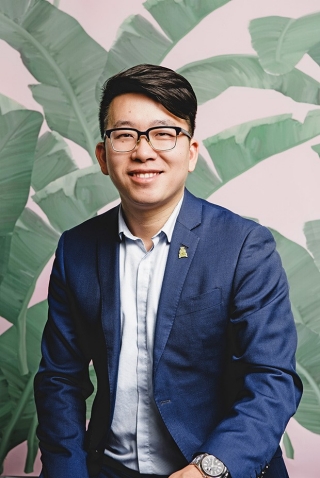Charlie Brown creator and cartoonist Charles M. Schulz once astutely noted, “All you need is love. But a little chocolate now and then doesn’t hurt.” Just ask Yingzhi “Easy” Wang, BComm (Mktg) 07, who co-founded the hugely-successful Montreal-based chain of Cacao 70 chocolate stores.
Cacao 70 now has more than 30 franchises worldwide, with three different store concepts — Cacao 70 Eatery, Cacao 70 Sweet House and Cacao 70 Dip Shop — where patrons can enjoy everything from hot chocolate or dipped ice cream cones, to a weekend brunch or inspired lunch.
Cacao 70’s vice-president of Development, Wang sat down for a candid Q&A about the growing global chocolate market.
How did you come up with the idea to open your first chocolate drinking bar in 2011?
Yingzhi “Easy” Wang: I am a big fan of coffee. I used to work in a café after I graduated from Concordia. But the coffee business is super competitive. So I thought, what else is similar? There is coffee, tea and hot chocolate. Tea is a niche market in North America. That’s why I decided to open a chocolate drinking bar.
What is it about chocolate that people love?
Wang: There are ingredients, chemicals and compounds in chocolate that make people feel happier. I also remember one of my university classmates always brought chocolates before an exam, because it gave her energy.
There is the phrase “Life is like a box of chocolates.” You never know what chocolate will be next. Chocolate has become a candy. But it also can be a great ingredient for food and beverages. This is why I thought selling chocolate products could work.
You now have more than 30 franchises.
Wang: Yes. Last year we opened our first Chinese location in Tianjin, as well as in the United States. Our flagship location at Xintiandi Mall, Shanghai, is expected to open its doors this spring. The Asian market is a completely different market compared to Canada, or North America in general. Our chocolate makers adjusted our recipes catering to the market. And we also collaborated with local creative chefs to develop our offerings.
Your talented, local chocolate maker develops the recipes from scratch. You also have a chocolate factory in Montreal.
Wang: My chocolate maker has received gold and silver international awards for our chocolate. In 2017 I opened a chocolate factory in Montreal. It’s an open-to-the-public chocolate factory, a production facility which also hosts tours for visitors. It is a way for people to see how our chocolate products are made. It is also educational for young people who are passionate about what they are eating. We get visitors from around the world. They can witness the whole process. In addition to the guided tour our factory provides, we also have a cafe built in the space where people can see the entire chocolate production while they are enjoying a hot chocolate or snack.
What advantage do you have over global chocolate brands?
Wang: Big chocolate companies usually try to maintain the consistency of their product — taste and texture. What we try to do is profile the different taste of the cacao beans. The profile of cacao beans will vary with the climate they are grown in. Even within the same latitude, different geographic locations will produce different beans with distinctive tastes.
How did your time and studies at Concordia's John Molson School of Business help shape you and your career?
Wang: Education can teach you about life, it doesn’t matter what you study. You may be strong here and there, but the thing for me is how you treat people, meet new people and open your heart to learn new experiences. Concordia helped open my world to all of these experiences.
 Cacao 70 co-founder and vice-president of Development Yingzhi “Easy” Wang markets chocolate around the world | Photo: Courtesy of Cacao 70
Cacao 70 co-founder and vice-president of Development Yingzhi “Easy” Wang markets chocolate around the world | Photo: Courtesy of Cacao 70


